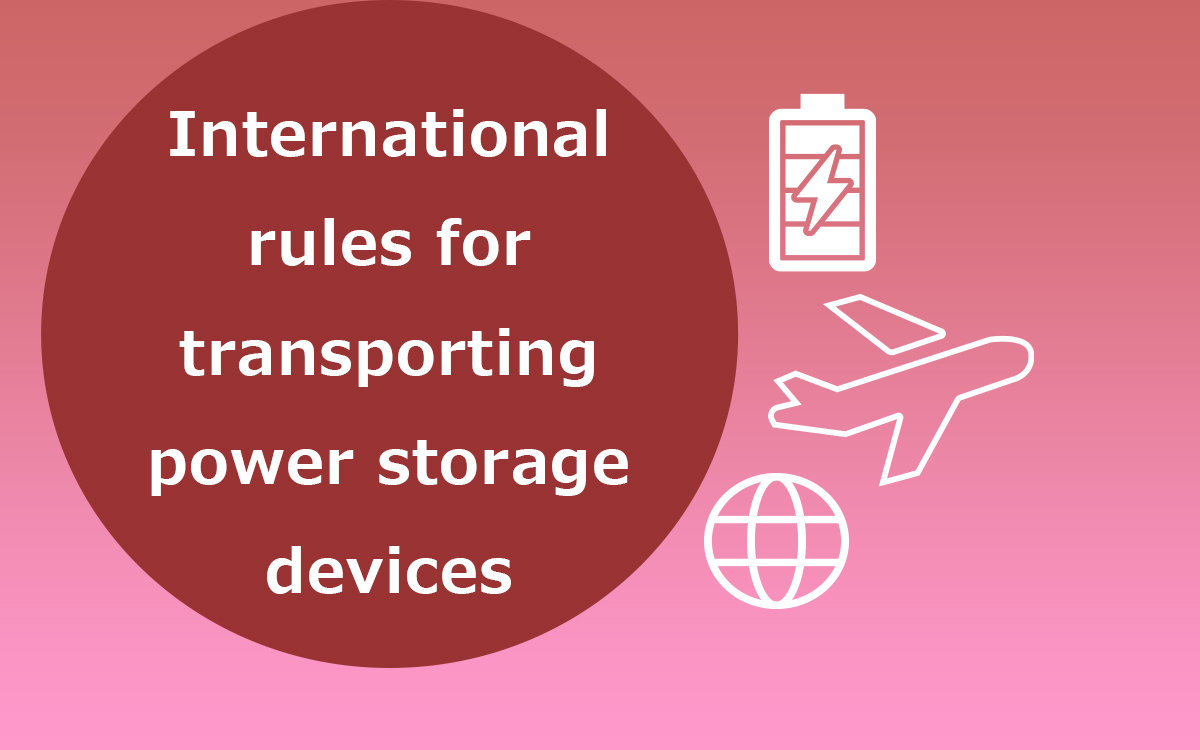International rules for transporting power storage devices such as lithium-ion batteries

In "Safety of Lithium Ion Batteries and Hybrid SuperCapacitors", we introduced the safety features of both devices. Today, lithium-ion secondary batteries (hereinafter referred to as "lithium-ion batteries") are used all over the world. In addition to ensuring product safety, it is also essential to create a mechanism for the safe transportation of these products. In particular, power storage devices such as lithium-ion batteries may generate heat or catch fire and are classified as dangerous goods under international rules, so care must be taken when transporting them internationally, such as when importing or exporting.
This time, we will introduce the rules established for international transportation of these items.
International rules for carrying lithium-ion batteries
There are various dangerous goods in the world, but the highest rule for international transportation of these dangerous goods is the United Nations (UN) "Recommendations for Transporting Dangerous Goods" (hereinafter referred to as "UN". Recommendation "). All transport regulations of each country related to air and sea transport are set based on this UN recommendation, and their influence is extremely widespread. Therefore, here we would like to introduce the UN recommendations.
The UN Recommendation sets a UN number for each dangerous goods. For example, lithium-ion batteries are classified as dangerous goods specified by the UN number UN3480.
In other words, when transporting lithium-ion batteries internationally, it is necessary to comply with the packaging form and maximum load capacity specified as dangerous goods UN3480.
On the other hand, the UN Recommendation also has special provisions that allow lithium-ion batteries to be transported as non-dangerous goods if they meet certain conditions. Here are some examples of the conditions.
- Pass the test assuming low pressure conditions during air transportation.
- Pass the test assuming sudden temperature changes.
- Pass the test assuming vibration, shock, and collision during transportation.
- Pass the test assuming an external short circuit.
- Pass the test assuming overcharge and forced discharge.
Lithium-ion batteries that meet the above conditions are permitted to be transported under looser regulations as non-dangerous goods. Therefore, many lithium-ion battery manufacturers ship and transport their products after confirming that they pass the tests specified in the special regulations.
International rules for carrying Hybrid SuperCapacitors (also known as Lithium-ion Capacitors)
Hybrid SuperCapacitors (HSCs) use a carbon-based material that can occlude lithium ions as a negative electrode material while using the principle of a general electric double layer capacitor, and the energy density is improved by adding lithium ions to it. It is a capacitor.
Hybrid SuperCapacitors (HSCs) have features such as high output, long life, and high safety.
As new power storage devices are gradually recognized by the world, there is an increasing momentum to proceed with the development of rules for handling and transporting them safely with the cooperation of lithium-ion capacitor manufacturers.
Then, in 2009, the challenge to obtain a UN number for Hybrid SuperCapacitors (also known as “Lithium-ion Capacitors”) began.
In order to obtain a UN number, it is necessary to go through the process of proposing it to a UN expert committee and receiving approval while consulting the deliberations over a period of about three years. The following two points are the points of transportation regulation for Hybrid SuperCapacitors agreed upon by each lithium-ion capacitor manufacturer.
- The rules should be such that the dangers of Hybrid SuperCapacitors are fully considered and safe transportation is possible.
- It is a rule that can be transported economically by eliminating excessive regulatory measures.
While referring to the transportation regulations for lithium-ion batteries and electric double layer capacitors (EDLC) that are already in operation, we proceeded with efforts aimed at regulations that balance safety and economy.
At the UN expert committee meeting, it was possible to explain that Hybrid SuperCapacitors are safer devices than lithium-ion batteries, and to obtain the consent of the committee members of each country to make the transportation regulations more lenient.
Thus, from January 2015, capacitor (including Hybrid SuperCapacitors) transportation under UN number UN3508 began. The main requirements of the special provisions are as follows.
- Pass the test assuming low pressure conditions during air transportation.
- Pass the 1.2m drop test.
You can see that it is much simpler than the conditions stipulated in the special regulations for lithium-ion batteries. This can be said to indicate that the relative safety of Hybrid SuperCapacitors has gained a certain level of understanding in the United Nations, an international organization, thanks to the efforts of lithium-ion capacitor manufacturers.
Summary of international transportation rules for power storage devices
How was that?
We introduced the international rules for safely carrying lithium-ion batteries and Hybrid SuperCapacitors and the background behind their setting.
Musashi Energy Solutions (MES) is developing and manufacturing the Hybrid SuperCapacitors mentioned in this blog today. Newly developed products always pass the tests stipulated in this special regulation, and as non-dangerous goods internationally. MES delivers these products to users in each country.
MES is developing and manufacturing the Hybrid SuperCapacitors mentioned in this blog today. If you are interested in or have any questions about Hybrid SuperCapacitors, please contact us using the inquiry form.
* Please understand that the description in this blog includes interpretations based on the author's experience and subjective opinions. In addition, the technical information contained in this blog does not grant any guarantee or license to the intellectual property rights or other rights of the Company or a third party.
